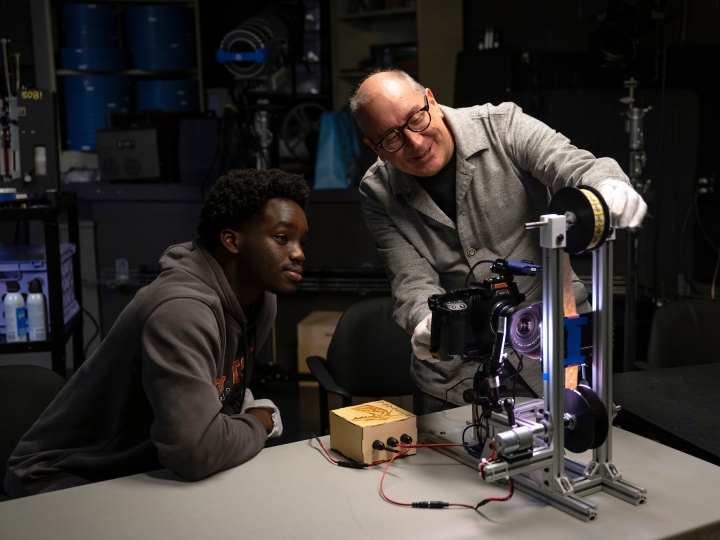An Inside Look at Summer Research, Part 2
August 3, 2017
Learning doesn't take a vacation at Bucknell University.
Each summer dozens of undergraduate research interns return to campus to immerse themselves in a single project and work in close collaboration with faculty advisers. It's a signature experience of a Bucknell education that provides in-depth opportunities for self-motivated inquiry and rich engagement with the subjects that fascinate students the most.
Research interns receive support from the University in the form of housing and a $3,000 stipend to cover living expenses over the summer. In return, the students must share what they learn at the annual Kalman Research Symposium the following April. While some labs in the sciences employ as many as eight to 10 students, summer research opportunities are available to all Bucknell students — all that's required to apply is a good idea and the support of a faculty member. Support for internships comes from a variety of sources, including the University at large, individual departments and colleges, dedicated endowments and even partnerships with area nonprofits such as the Geisinger Health System.
Learn how Bucknellians are spending their summers in this, the second in a two-part series. Click here to read Part 1.
Mikayla Berliner '18, psychology and economics
"Why do we make the purchasing decisions that we do? As a psychology and economics double major, I have always been interested in consumer behavior. People are usually surprised by the seemingly unusual combination of my two majors, but I've come to realize that economics and psychology are incredibly interconnected. The intersection of the two fields fascinates me, so I wanted to delve into it more through the Bucknell Program for Undergraduate Research.
"I was inspired by the recent policy debate over the labeling of products containing genetically engineered ingredients, commonly called genetically modified organisms (GMOs). While many European countries have required all products containing GMOs to be labeled, the United States has instead adopted a voluntary labeling regime. Many U.S. consumers believe they have the right to know when there are GMOs in their food, while many food producers worry that their sales will take a hit once GMOs are labeled. The policy debate lives on, but what is the true psychological and economic impact of GMO labeling?
"I developed my research project with Professor Geoff Schneider, economics. In an online survey, I am investigating how Bucknell students behave based on the type of GMO labeling a bag of potato chips displays. Some bags are labeled non-GMO, some are labeled GMO, and some have no label at all. I hope to find out whether or not Bucknell consumers are willing to pay more or less for some bags over others. The fact that my results will give insight into consumer purchasing behavior that could help resolve the GMO labeling policy debate is pretty cool to me."
Cilicia MacArthur '20, animal behavior
"This summer, I have started a behavioral study on interactions between female Hamadryas baboons before and after they've copulated with a male. Hamadryas baboons are a one-male unit species, meaning every female in the group mates with the same male. In human terms, these baboons can display what might be thought of as a measure of 'jealousy.' My study also involves observing changes in aggressive and other behaviors among juvenile and adolescent males, and how they may affect social rank and mate choice in the future. I plan on continuing these observations for the next three years.
"My other major project is part of animal behavior professor Peter Judge's sabbatical on social cuing in capuchin monkeys. I test the subject monkey's ability to find a hidden food reward using a visual cue from a human, another capuchin or an inanimate object. In addition to these projects, I am continuing to test the capuchins in a study for metacognition, which is essentially their ability to understand the extent of their own knowledge."
Tom Sleigh '18, environmental studies
"This summer, I am researching whether the Adam T. Bower Memorial Dam, an inflatable dam near Sunbury, Pa., affects the native fish population. I'm working under the mentorship of Sean Reese, an aquatic biologist with the Watershed Sciences & Engineering Program at the Bucknell Center for Sustainability & the Environment. I want to find out how functional organization of fish communities is related to hydrological variation due to seasonal inflation of dam in the lower West Branch of the Susquehanna River. To do this, we are collecting, identifying and measuring fish and then releasing them unharmed.
"As an outdoor enthusiast, I am very passionate about this research project. If I am not involved with schoolwork or wrestling practice, you can usually find me on a stream or river fishing. I believe this research topic is extremely important in demonstrating how hydrological variation not only on the Susquehanna River but also throughout the world can affect native fish species. So far, I've had an incredible experience participating in this field-based research project, and have enjoyed many new learning experiences. I would recommend summer research to any student at Bucknell."
Casey Venema '18, English – film/media studies and theatre
"I'm editing a documentary focused on the 100th Monkey Theatre Ensemble, a devised theatre company that was founded by Professor Anjalee Deshpande Hutchinson, theatre & dance, and Bucknell alumna Tina Cody '12. The group was here in early July devising a piece that they plan to take to Edinburgh Fringe Festival, and I wanted to document their process and narrative as a fledgling company. As a film and theatre major (and a member of 100th Monkey) I am deeply interested in the way that film and theatre interact and influence each other as art forms. My advisers, Rebecca Meyers and Professor Hutchinson, have been helping me create a piece that bridges that gap both artistically and intellectually."

